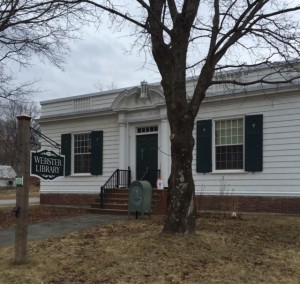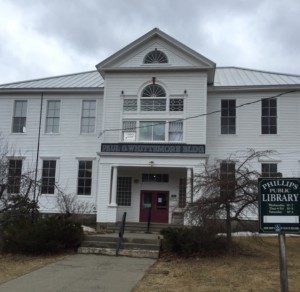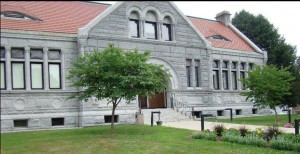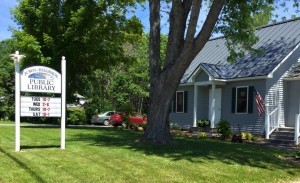Libraries: The cost is little, the return great
By Maureen Milliken
We live in a cost versus return world. I never took economics in school, and I know if I did I would have stunk at it. I don’t know the accurate phrase for it, but what I’m talking about, basically, is the philosophy that if you’re going to pay for something you need to see a return in something tangible. Preferably money. If not money, goods.
Many people would like to see government run like a business, with a return on the “investment” of our taxes showing in… well, I’m not sure what. Free ice cream for everyone? Bonuses when we come in under budget?
The less tangible returns, like a well-educated population or an arts culture that can enrich a community and ultimately benefit it in ways more than just economic, are dismissed and frequently forgotten. People frequently say that the private sector will pick up where public money leaves off, but the private sector seems to want its free ice cream, too.
The whole cost versus return thing was on my mind recently as I took a road trip through Franklin County, the site of the fictional town in my Bernie O’Dea mystery series. I was fulfilling a self-imposed obligation that I’d put off for way too long: delivering copies of Cold Hard News, the first in the series, to libraries.
I was donating the books, whether the libraries liked it or not. It’s something I’d vowed to do long before my book was published last June.

Webster Library in Kingfield
I grew up in libraries and without them there would be no Cold Hard News. Who knows? There may not even be Maureen the newspaper editor or Maureen the productive member of society. I think most writers can say the same.
Donating my book, I figured, was the least I could do. Really, when you think about it, the very least. Still, it’s funny the reaction I sometimes get from people who believe I should try to push the libraries to buy it instead. Some libraries, I’ve found, already have, and I’m grateful. On the other hand, I’m not going to miss that few dollars (an attitude, I’m sure, that contributes to the hatred I feel from my oil dealer and mortgage company). It’s a small return to the libraries for the what they’ve given to me.
As I visited several Franklin County libraries a couple weeks ago, I was reminded, too, what warm and welcoming places they are. How great they smell and how good it feels to be in them. How I want to sink down in a row of books and just start reading.
It’s also hard not to be reminded of how they struggle daily to offer the basics, much less the extras that they do.
I spent half an hour talking to the librarian in Phillips about their programs. I spent another twenty minutes talking to the Kingfield librarian, who’d only been in the job a short time, but had big plans and a lot of optimism about what will be happening at Webster Library.

Phillips Public Library
Then this happened in the last town I visited. The librarian looked at me with dismay when I offered my book (I’m not making that up). She didn’t want to take it. “We’d have nowhere to put it. You can see how small we are.” It was small, a very tiny, crowded room.
I assured her the book wasn’t self-published, was that the problem? Not really, but “If we took yours, we’d have to take everyone’s.”
I gave her my information sheet, complete with blurbs and all sorts of other great stuff, to reassure her it wouldn’t be a waste of shelf space. “The book has been fairly well-received,” I said.
I finally wore her down and she took it, saying maybe she could put it out on the table for people to read and see what they thought. If they liked it, it’s possible she could squeeze it in somewhere.
I walked away troubled. Not by the exchange so much (30 years in the newspaper business makes me fairly immune to people who aren’t in love with what I have to offer), but by the position the librarian was in that would force her to … reject a free book.
Let’s forget, for a second, the possible parade of horrific unreadable books that are being foisted on this tiny, remote west-central Maine library that would force a librarian to regard an author with horror when she tries to donate a book.
The issue is actually, I’m sure, that she’s fighting a constant battle of no space, probably little help and a diminishing budget with possibly little show of support from the community. And here I am barging in with a big smile and a book and it’s all too much.
So sad, not only for that library and librarian, but for that town.

Lithgow Library in Augusta
When I moved back to Maine five years ago, I wanted to live in a town that was fairly centrally located between Augusta and Waterville, the two cities I’d be working in, but that also had a vibrant community and a story open year-round I could walk to. It never occurred to me to check out the library.
I’d grown up in Augusta, a few blocks from beautiful, wonderful Lithgow, which as I write this is undergoing an $11.5 million renovation.

Belgrade Public Library
When I landed in Belgrade, I found its library, like the one I visited a couple weeks ago in Franklin County, jammed into about 250 square feet of space in the community center. Thanks to a dedicated group of volunteers and a generous donation from Hammond Lumber, the Belgrade Public Library opened in a new, bigger building a year or two later. It gets a lot of support from the community, if not always from the town government or budget.
Had I known, when I moved to town, that there wasn’t a full-time, fully supported library that was embraced by the town government, I wonder what impact it would have had on my decision to live here? I’m not sure if it would have made me look somewhere else, but it definitely would have affected my decision.
Libraries cost money. The return, though, is immense. Priceless and uncountable.
I’m not just talking about their impact on lives of weird little girls who grow up to become mystery writers, but their impact on the community as a whole. The librarians in Phillips and Kingfield talked enthusiastically about their communities and the library’s role in it. It’s hard to believe that type of involvement isn’t felt by a community in rippling, uncountable ways.
This is National Library Week. I’m urging everyone to weigh the “cost” of their town’s library against the return, and let your library know — in a tangible way — that the cost is worth it.
***
Speaking of libraries, join me, and fellow mystery writers Kathy Lynn Emerson and Janet Morgan 1-3 p.m. Thursday at Lithgow Library in Augusta (i’s temporary location at the Ballard Center, East Chestnut Street, the old Augusta General Hospital), for a Sisters in Crime Speakers Panel discussion on The Modern Heroine as well as other other mystery-related topics. We’ll have books available and be happy to sign.
Maureen Milliken is the author of Cold Hard News, the first in the Bernie O’Dea mystery series. The second, No News is Bad News, is due out this summer. Follow her on Twitter: @mmilliken47, or on Facebook at Maureen Milliken mysteries. Sign up for email updates on her website, maureenmilliken.com.



